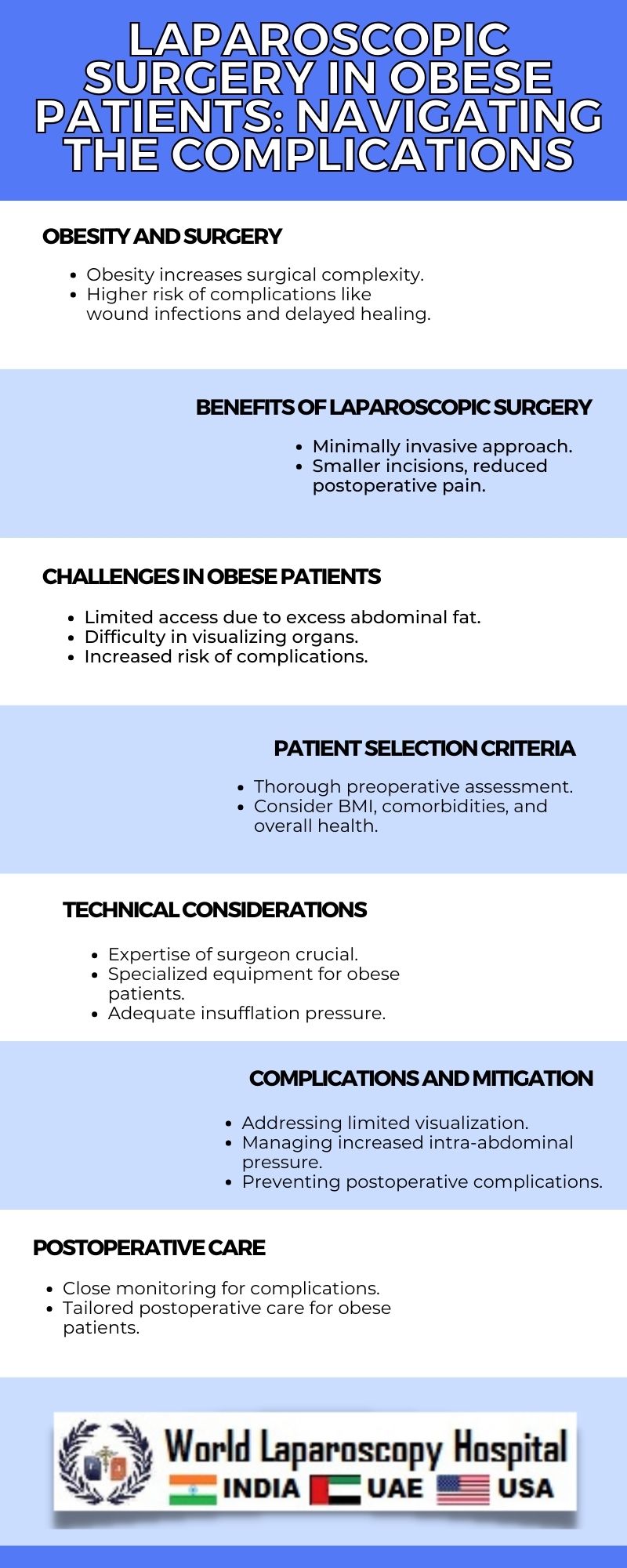Laparoscopic Surgery in Obese Patients: Navigating the Complications
Introduction
In recent years, laparoscopic surgery has emerged as a revolutionary technique in the field of surgery, offering numerous advantages such as smaller incisions, reduced pain, and faster recovery times. However, when it comes to obese patients, this innovative approach presents a unique set of challenges and complications that demand careful consideration and strategic navigation.

The Rise of Laparoscopic Surgery
Laparoscopic surgery, also known as minimally invasive surgery, involves the use of small incisions and specialized instruments with the aid of a camera to perform various surgical procedures. It has gained popularity across various medical disciplines due to its potential to minimize postoperative pain, shorten hospital stays, and improve overall patient outcomes.
The Obesity Epidemic and its Impact on Surgery
The global obesity epidemic has profound implications for healthcare, affecting nearly every medical specialty, including surgery. Obesity is associated with an increased risk of various health conditions, such as diabetes, cardiovascular diseases, and certain types of cancer. When it comes to surgery, obese patients pose unique challenges due to their altered anatomy, increased intra-abdominal fat, and the presence of comorbidities.
Specific Challenges in Laparoscopic Surgery for Obese Patients
Access and Visualization
One of the primary challenges in laparoscopic surgery for obese patients is gaining adequate access to the surgical site. The increased thickness of the abdominal wall in obese individuals can make it challenging to create suitable entry points for laparoscopic instruments. Additionally, the excess adipose tissue can compromise the clarity of the visual field, making it difficult for surgeons to navigate and perform precise maneuvers.
Technical Difficulties
Obese patients often present technical difficulties during laparoscopic procedures. Manipulating instruments within the confined space of the abdomen becomes more intricate, and surgeons may encounter difficulties in suturing, stapling, or achieving hemostasis. These challenges demand a high level of expertise and experience to ensure the safety and success of the surgery.
Increased Risk of Complications
Obese patients undergoing laparoscopic surgery face an elevated risk of complications, including wound infections, deep vein thrombosis, and respiratory issues. The compromised respiratory function, often seen in obese individuals, poses additional challenges during anesthesia and postoperative recovery.
Strategies to Enhance Laparoscopic Surgery in Obese Patients
Patient Selection and Preoperative Optimization
The careful selection of obese patients for laparoscopic procedures is crucial. Comprehensive preoperative assessments should focus on optimizing patients' overall health, addressing comorbidities, and ensuring adequate cardiopulmonary fitness. Weight loss interventions, when feasible, may be considered to improve surgical outcomes.
Modified Surgical Techniques
Adapting traditional laparoscopic techniques for obese patients is essential. Surgeons may need to make adjustments in trocar placement, instrument selection, and visualization techniques to accommodate the unique anatomy of obese individuals. Advances in technology, such as longer and more robust laparoscopic instruments, can aid in overcoming technical challenges.
Team Collaboration and Training
Successful laparoscopic surgery in obese patients requires a collaborative approach involving surgeons, anesthesiologists, and other healthcare professionals. Comprehensive training programs focusing on the nuances of laparoscopic procedures in obese individuals can enhance the skills of the surgical team, improving overall patient outcomes.
Postoperative Care and Monitoring
Vigilant postoperative care is essential in obese patients undergoing laparoscopic surgery. Close monitoring for complications, particularly respiratory issues and wound infections, is crucial. Implementing enhanced recovery protocols tailored to the needs of obese individuals can contribute to a smoother and faster recovery process.
Future Directions and Innovations
As technology and surgical techniques continue to evolve, the future of laparoscopic surgery in obese patients holds promise. Robotics, augmented reality, and other innovative approaches may further enhance the precision and safety of these procedures. Ongoing research is needed to explore novel strategies for optimizing outcomes in this challenging patient population.
Conclusion
Laparoscopic surgery has revolutionized the field of surgery, offering numerous benefits for patients across various medical conditions. However, when it comes to obese individuals, the challenges are unique and require a thoughtful and multidisciplinary approach. By carefully selecting patients, adapting surgical techniques, and fostering collaboration among healthcare professionals, surgeons can navigate the complexities of laparoscopic surgery in obese patients, ultimately improving outcomes and advancing the field of minimally invasive surgery.
| Older Post | Home | Newer Post |

